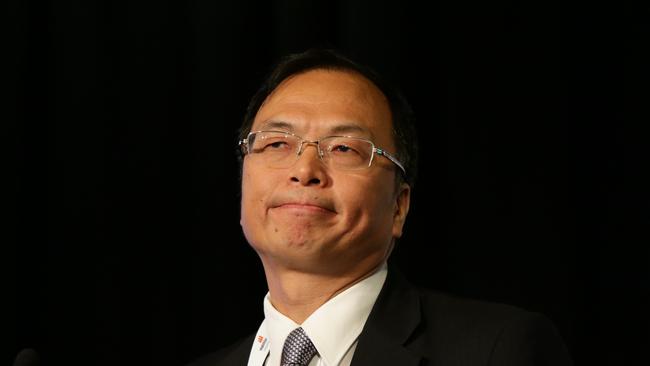Coal, iron ore ‘vulnerable’ in China dispute
Senior executives across the China trade divide have warned the industrial powerhouse could look to alternative sources of key commodities.

Senior executives across the China trade divide have warned the industrial powerhouse could look to alternative sources of key commodities if tensions between the two nations do not ease, amid fears China could slow coal imports from Australian producers.
South32 boss Graham Kerr and Li Xinchuang, vice-president of the China Iron and Steel Association, separately warned on rising trade tensions on Friday, saying the political spat between Beijing and Canberra could eventually impact Australia’s commodity exports if China chose to look elsewhere for primary suppliers.
“The next six months are going to be choppy. Obviously there are tense relationships between China and Australia. Trump is very clearly increasing the pressure on China around COVID-19 and also trade, which again is not great for companies that rely on free trade,” Mr Kerr said.
“If China switches to buying minerals from other countries, then Australia will suffer too much,” Mr Li told The Weekend Australian.
“There may be a slight easing because the market is the market. If you have an oversupply, you need to pull back every now and then. But the relationship between the two countries is still very important. It will endure beyond any of these tensions we hear about.”
The comments come against the backdrop of new talk China could target Australian metallurgical and thermal coal exports, after slapping hefty tariffs on barley. Unconfirmed reports suggest Chinese utility companies are being encouraged to slow purchases of Australian thermal coal.
But market sources say it is difficult to separate rumour from fact, and pressure from domestic producers, keen to rein in cheap imports that are putting local mines under pressure, could be getting conflated with talk of political retaliation against Australia from other parts of China’s administration.
One executive with experience of marketing commodities in China said he believed China’s leaders would be more than happy to stoke such rumours to put more pressure on Canberra, even if no direct action was planned.
“The problem is that when this stuff hits the headlines it gets its own momentum and makes it much harder to know what's actually going on. We’ll know for sure when they stop taking cargoes, I guess, or not,” he said.
A trader active in the coal market said he believed even an outright directive to stop buying Australian product would only have a limited impact on sales, as it would likely be quickly reversed if rising coal prices put pressure on input costs for Chinese state-backed power companies and steel mills. But the political messaging, even if indirect, could encourage Chinese buyers to seek alternatives to Australian shipments in the near term, with exporters from Russia, Mongolia, the US and South America always keen to capture Australian market share if prices rise.
Mr Kerr said he believed iron ore would remain unaffected by tensions, as Brazil’s renewed problems had left Australian producers as the most reliable source of the steelmaking commodity.
“But already in things like metallurgical coal and other products, you are starting to see some pressure on those prices because Australia isn’t the only place that China can go shopping,” he said.
Mr Li said China was likely to return to Australia as its cheapest and most reliable supplier of key commodities in the long term.
“We can turn our minerals from Australia to Brazil, Africa, Mongolia, India and Russia. However, the cost is higher than what we pay for Australia and if we increase the volume from local mining companies you have a different quality also. So Australia remains integral to China and vice versa,” he said.
Wood Mackenzie coal analyst Rory Simington told The Weekend Australian he believed the talk of import restrictions on Australian thermal coal was aimed at the flood of cheap international coal into its market, with Chinese imports so far this year annualising at almost 75 million tonnes higher than 2019.
“While there is much uncertainty around the potential ban, we think it is unlikely to have a major impact on the market. Thermal coal imports into China have been subject to numerous restrictions, quotas and import bans in recent years; however, the actual impact on trade has been comparatively minor,” he said,
“The reason the trade has been so resilient in recent years is due to the competitiveness of imported coal and Australian imported material in particular.”

To join the conversation, please log in. Don't have an account? Register
Join the conversation, you are commenting as Logout